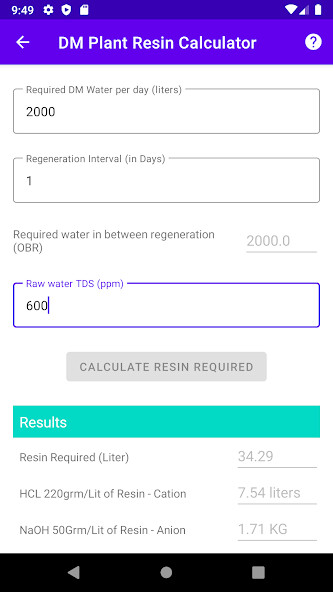We provide WTP - Calcs online (apkid: com.sunstaraquacare.softnerresincalculator) in order to run this application in our online Android emulator.
Description:

Run this app named WTP - Calcs using MyAndroid.
You can do it using our Android online emulator.
Calculate the quantity of the Resins required to soften the Hard water for Softener & DM Plants.
Hard water interferes with almost every cleaning task, from laundering and dishwashing to bathing and personal grooming.
The amount of hardness minerals in water affects the amount of soap and detergent necessary for cleaning.
Soap used in hard water combines with the minerals to form sticky soap curd.
Some synthetic detergents are less effective in hard water because the active ingredient is partially inactivated by hardness, even though it stays dissolved.
This happens because magnesium, calcium and lime, along with many other minerals are positively charged ions.
So when you have the presence of these minerals (positively charged ions) in the water, other positively charged ions will dissolve less easily in hard water than in soft water or water that does not contain these minerals (calcium, magnesium, lime).
This is what causes soaps and detergents not to dissolve sufficiently in the hard water, because the sodium and potassium hydroxide which is used in most detergents and soaps provide positively charged ions to promote chemical reactions.
Bathing with soap in hard water leaves a film of soap curd on the skin.
The film may prevent soil and bacteria from being removed.
Soap curd interferes with the skin returning to its normal slightly acid condition and may lead to irritation.
Hard water also contributes to inefficient and costly operation of water-using appliances.
Heated hard water forms a scale of calcium and magnesium minerals that can clog pipes, reducing water flow and ultimately requiring the piping to be replaced and destroy water using appliances.
Due to this lime scale build-up, the efficiency of hot boilers and tanks are reduced.
As water moves through soil and rock, it dissolves very small amounts of minerals and holds them in solution.
Dissolved calcium and magnesium are the two most common minerals that make water hard.
The degree of the hardness of water increases as more minerals are dissolved in the water.
You get rid of the minerals in your water by softening your water.
Water softening is a technique that serves the removal of the ions that cause the water to be hard, in most cases calcium and magnesium ions.
Iron ions may also be removed during softening.
The best way to soften the water is to use a water softener unit and connect it directly to the water supply.
"With all this in mind, its clear why water softeners are so popular: They remain the least costly and most effective way to rid your water of troublesome minerals"
Hard water interferes with almost every cleaning task, from laundering and dishwashing to bathing and personal grooming.
The amount of hardness minerals in water affects the amount of soap and detergent necessary for cleaning.
Soap used in hard water combines with the minerals to form sticky soap curd.
Some synthetic detergents are less effective in hard water because the active ingredient is partially inactivated by hardness, even though it stays dissolved.
This happens because magnesium, calcium and lime, along with many other minerals are positively charged ions.
So when you have the presence of these minerals (positively charged ions) in the water, other positively charged ions will dissolve less easily in hard water than in soft water or water that does not contain these minerals (calcium, magnesium, lime).
This is what causes soaps and detergents not to dissolve sufficiently in the hard water, because the sodium and potassium hydroxide which is used in most detergents and soaps provide positively charged ions to promote chemical reactions.
Bathing with soap in hard water leaves a film of soap curd on the skin.
The film may prevent soil and bacteria from being removed.
Soap curd interferes with the skin returning to its normal slightly acid condition and may lead to irritation.
Hard water also contributes to inefficient and costly operation of water-using appliances.
Heated hard water forms a scale of calcium and magnesium minerals that can clog pipes, reducing water flow and ultimately requiring the piping to be replaced and destroy water using appliances.
Due to this lime scale build-up, the efficiency of hot boilers and tanks are reduced.
As water moves through soil and rock, it dissolves very small amounts of minerals and holds them in solution.
Dissolved calcium and magnesium are the two most common minerals that make water hard.
The degree of the hardness of water increases as more minerals are dissolved in the water.
You get rid of the minerals in your water by softening your water.
Water softening is a technique that serves the removal of the ions that cause the water to be hard, in most cases calcium and magnesium ions.
Iron ions may also be removed during softening.
The best way to soften the water is to use a water softener unit and connect it directly to the water supply.
"With all this in mind, its clear why water softeners are so popular: They remain the least costly and most effective way to rid your water of troublesome minerals"
MyAndroid is not a downloader online for WTP - Calcs. It only allows to test online WTP - Calcs with apkid com.sunstaraquacare.softnerresincalculator. MyAndroid provides the official Google Play Store to run WTP - Calcs online.
©2024. MyAndroid. All Rights Reserved.
By OffiDocs Group OU – Registry code: 1609791 -VAT number: EE102345621.